Historical places in Hanoi offer a captivating glimpse into Vietnam’s rich and resilient past. From ancient pagodas to colonial architecture and wartime landmarks, the city’s heritage sites reflect its thousand-year-old legacy. Iconic locations like the Imperial Citadel, Hoa Lo Prison, and the Temple of Literature narrate stories of struggle, culture, and identity. These historical treasures not only showcase architectural beauty but also preserve the soul of the Vietnamese people. For history enthusiasts and curious travellers alike, Hanoi is a living museum waiting to be explored.
Top 10 Historical Places In Hanoi
Here is a list of the top 10 historical places in Hanoi for every traveller.
1. Ho Chi Minh Mausoleum
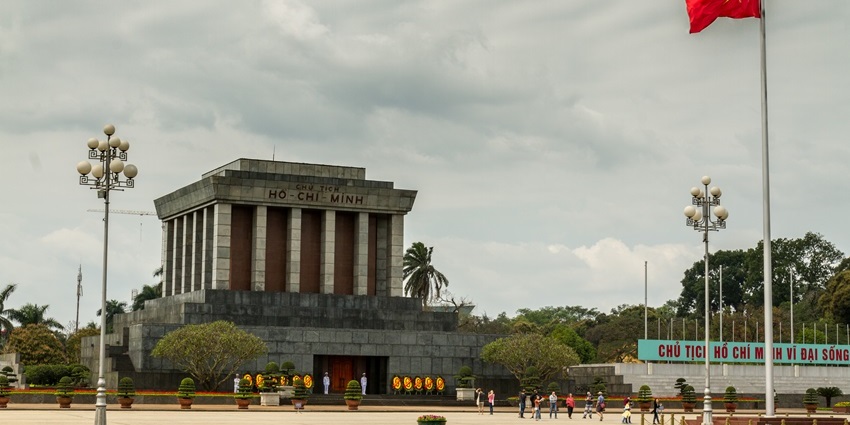
Photo: rhjpage / Wikimedia Commons
The Ho Chi Minh Mausoleum honours the revolutionary leader who founded modern Vietnam. Nestled in Ba Dinh Square, the site features grand Soviet-style architecture and a sombre ambiance. Visitors can pay respects to Uncle Ho’s embalmed body and explore the nearby Presidential Palace gardens. A symbol of unity and independence, the mausoleum remains one of Hanoi’s most sacred and visited monuments.
Distance From Noi Bai International Airport: 25 km
Distance From Hanoi Railway Station: 3 km
Places To Eat: Cong Caphe, KOTO Restaurant, Pho Thin
2. Temple Of Literature
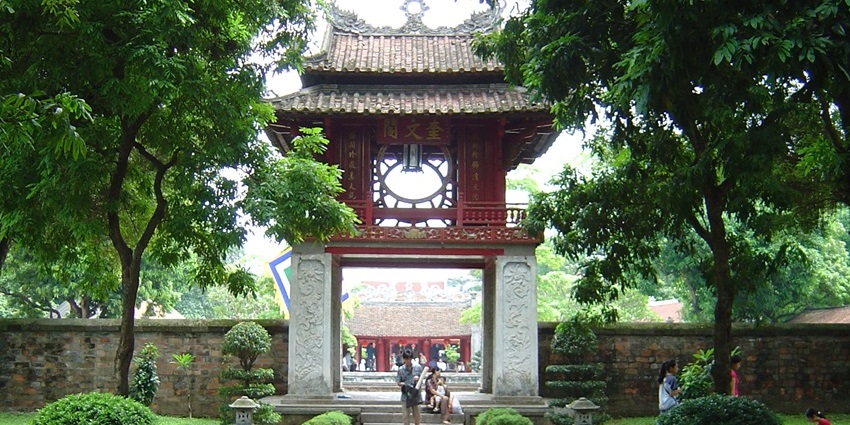
Photo: Chuoibk / Wikimedia Commons
Founded in 1070, the Temple of Literature is Vietnam’s first national university. Dedicated to Confucius, it features ancient courtyards, altars, and stelae on turtle backs, engraved with the names of scholars. This serene complex showcases the country’s commitment to education and moral principles. It remains a popular site for students praying for academic success and those seeking a peaceful, reflective escape in bustling Hanoi.
Distance From Noi Bai International Airport: Approximately 26 km
Distance From Hanoi Railway Station: 1.5 km
Places To Eat: Quan An Ngon, Banh Mi 25, Nha Hang Ngon
3. Hoa Lo Prison
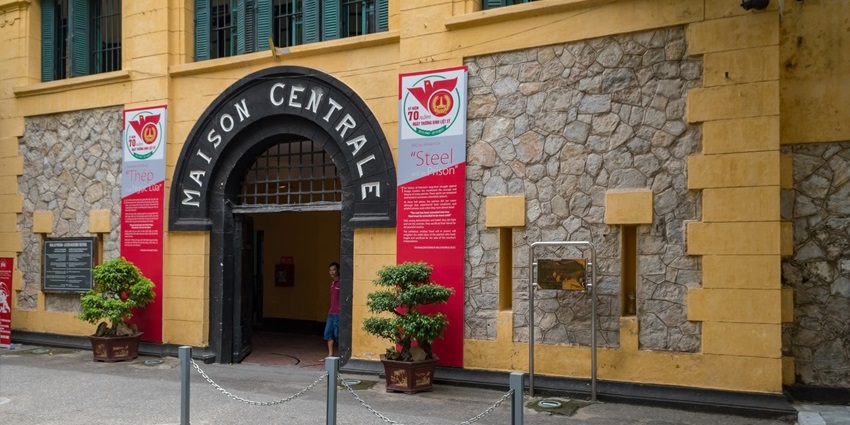
Photo: dronepicr / Wikimedia Commons
Hoa Lo Prison, nicknamed the Hanoi Hilton by American POWs, offers a chilling account of colonial and wartime struggles. Built by the French in the 1890s, it initially housed Vietnamese revolutionaries before becoming a prison for US pilots. Today, the museum displays artefacts, photographs, and reconstructed cells. It’s a sobering reminder of Vietnam’s path to independence and the pain endured in the process.
Distance From Noi Bai International Airport: 27 km
Distance From Hanoi Railway Station: 1 km
Places To Eat: Pho 10 Ly Quoc Su, Bun Cha Huong Lien, The Hanoi Social Club
4. Imperial Citadel Of Thang Long
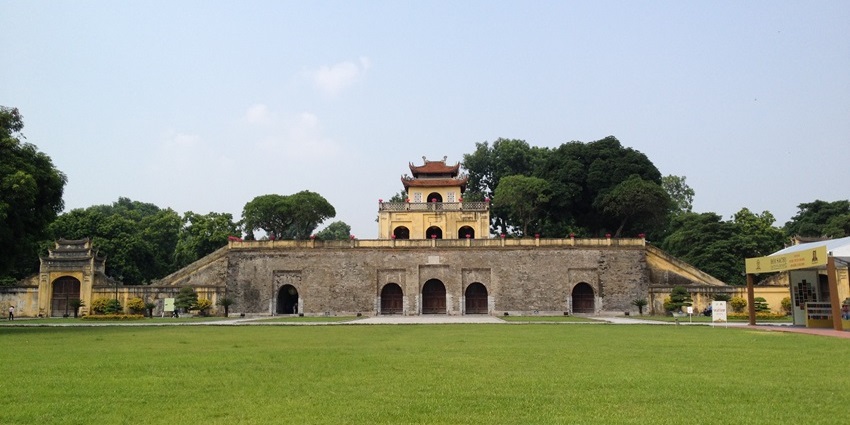
Photo: Phan Minh Tuấn / Wikimedia Commons
A UNESCO World Heritage Site, the Imperial Citadel of Thang Long served as the political centre for over a millennium. Visitors explore stone steps, war bunkers, ancient relics, and the commanding Flag Tower. This historic complex showcases Vietnamese resilience across dynasties and wars. Its layers of architecture and artefacts offer deep insight into the city’s regal and military past.
Distance From Noi Bai International Airport: 25 km
Distance From Hanoi Railway Station: 2 km
Places To Eat: Banh Cuon Gia Truyen, Cha Ca Thang Long, Green Tangerine
5. One Pillar Pagoda
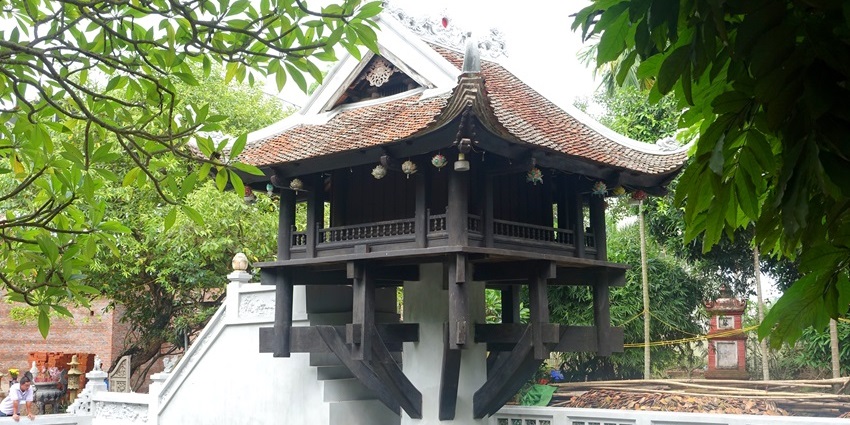
Photo: Daderot / Wikimedia Commons
Built in 1049, the One Pillar Pagoda is one of Vietnam’s most iconic temples. Constructed to resemble a lotus blossom rising from the water, it symbolises purity and enlightenment. Legend says Emperor Ly Thai Tong built it after a dream about a child being handed to him by a bodhisattva. Though reconstructed, it remains a revered site of spiritual significance in Hanoi.
Distance From Noi Bai International Airport: 25 km
Distance From Hanoi Railway Station: 3 km
Places To Eat: La Verticale, Bun Thang Ba Duc, Xoi Yen
6. Long Bien Bridge
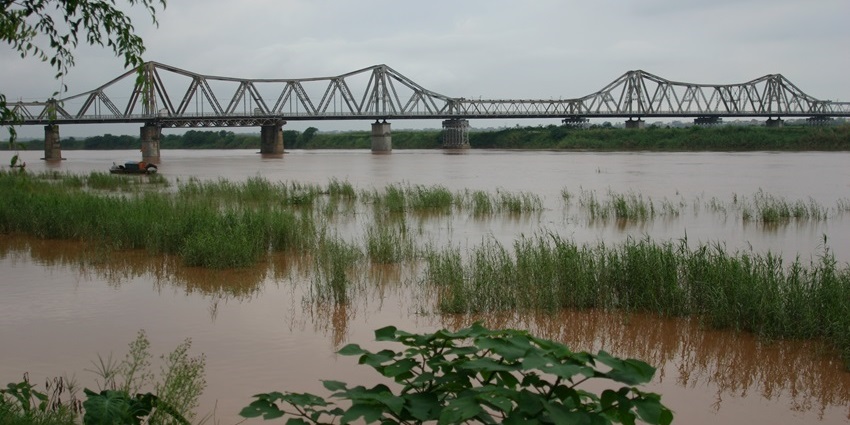
Photo: Pierre De Hanscutter / Wikimedia Commons
Designed by Gustave Eiffel, Long Bien Bridge spans the Red River and stands as a testament to colonial engineering and wartime survival. Built in 1902, the bridge was repeatedly bombed during the Vietnam War but still serves pedestrians and trains today. Its rusting girders and historic ambiance attract photographers and history buffs alike. Walking across offers unique views and poignant reflection on resilience..
Distance From Noi Bai International Airport: 28 km
Distance From Hanoi Railway Station: 4.5 km
Places To Eat: Maison de Tet Decor, Pho Thin Bo Ho, Red River Tea Room
7. Tran Quoc Pagoda
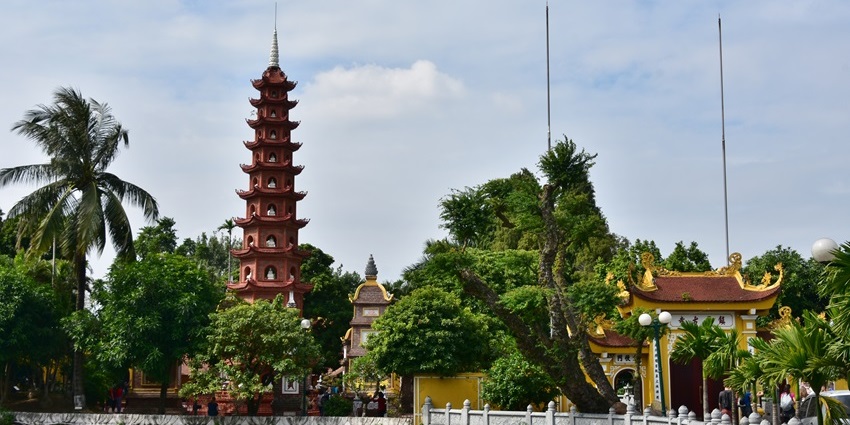
Photo: Richard Mortel / Wikimedia Commons
Tran Quoc Pagoda, Hanoi’s oldest Buddhist temple, is set on a small island in West Lake. Founded in the 6th century, it features a towering stupa, a bodhi tree from India, and beautiful lakeside views. The pagoda symbolises harmony and spiritual growth. It’s a quiet escape from the city, offering insight into Buddhist philosophy and traditional Vietnamese architecture.
Distance From Noi Bai International Airport: 25 km
Distance From Hanoi Railway Station: 4 km
Places To Eat: Sen Tay Ho, Pho Cuon Huong Mai, The Hanoi House
8. St. Joseph’s Cathedral
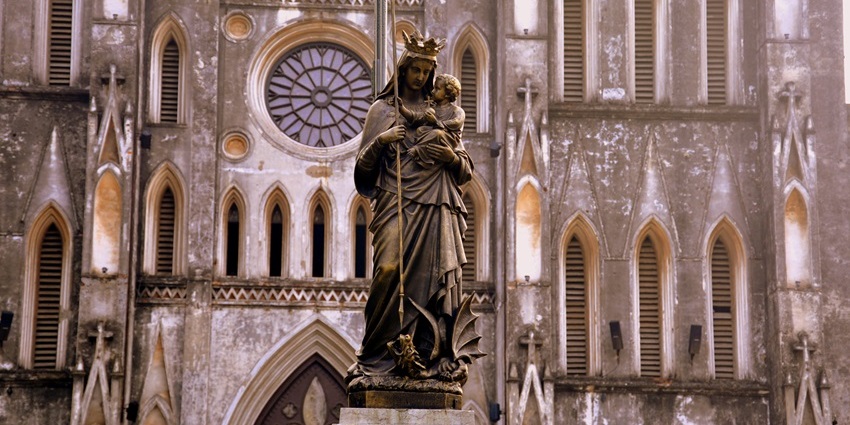
Photo: Eustaquio Santimano / Wikimedia Commons
St. Joseph’s Cathedral, built in 1886, is a striking example of neo-Gothic architecture. Its twin bell towers and stained glass windows mirror Notre-Dame in Paris. Located in Hanoi’s Old Quarter, it remains an active place of worship and a key colonial-era landmark. Christmas masses and local weddings offer visitors a cultural glimpse into the city’s Catholic community and historic legacy.
Distance From Noi Bai International Airport: 27 km
Distance From Hanoi Railway Station: 1.5 km
Places To Eat: Maison Marou, Noodle & Roll, The Note Coffee
9. Hanoi Flag Tower
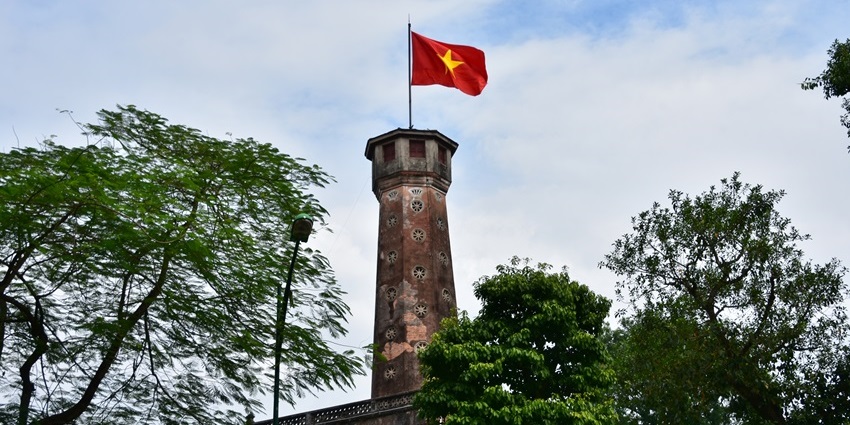
Photo: Richard Mortel / Wikimedia Commons
Built in 1812, the Hanoi Flag Tower stands 33 metres tall and serves as a patriotic symbol of the city. Located within the grounds of the Vietnam Military History Museum, it offers panoramic views and historical exhibitions nearby. The tower withstood colonial demolitions and wars, embodying national pride and endurance. It’s a popular spot for photos and cultural understanding.
Distance From Noi Bai International Airport: 25 km
Distance From Hanoi Railway Station: 1.5 km
Places To Eat: KOTO Van Mieu, Pho Suong, Highway4 Restaurant
10. Vietnam National Museum Of History
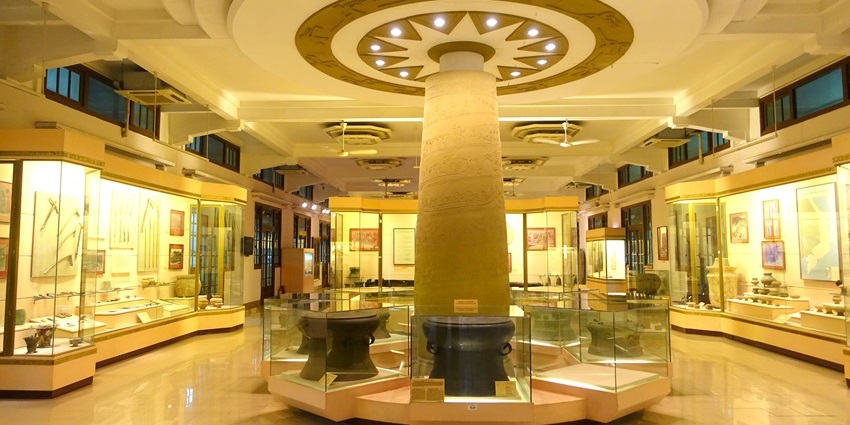
Photo: Daderot / Wikimedia Commons
This museum houses Vietnam’s history from prehistoric times to the modern era. Housed in an elegant colonial structure, its exhibits include Dong Son drums, Cham sculptures, and resistance artefacts. The chronological layout makes it easy to understand the nation’s journey. For those seeking a comprehensive introduction to Vietnamese history, this museum is a necessary stop while in Hanoi.
Distance From Noi Bai International Airport: 30 km
Distance From Hanoi Railway Station: 2.5 km
Places To Eat: Nha Hang Ngon, Quan Com Pho Co, Gecko Restaurant
Historical places in Hanoi stand as proud testaments to Vietnam’s enduring legacy. From ancient pagodas to French colonial landmarks and wartime memories, each destination invites you into a deeper understanding of the nation’s soul. These monuments preserve stories of struggle, resilience, and triumph, making them essential to any cultural itinerary. Plan your trip with TripXL today and let Hanoi’s vibrant history and enduring traditions captivate your senses and expand your appreciation of Vietnam’s rich past.
Cover Photo: Lars Curfs (Grashoofd) / Wikimedia Commons


 WhatsApp
WhatsApp
 Twitter
Twitter









